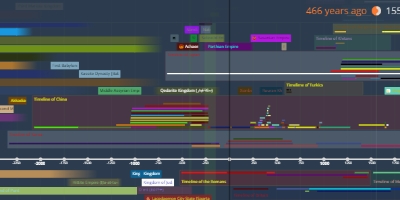Taiping Heavenly Kingdom (太平天國) (jan 11, 1851 – nov 18, 1864)
Description:
The Taiping Heavenly Kingdom, later shortened to Heavenly Kingdom or Heavenly Dynasty, was an unrecognized rebel state in China and Chinese Christian theocratic absolute monarchy from 1851 to 1864, supporting the overthrow of the Qing dynasty by Hong Xiuquan and his followers. The unsuccessful war it waged against the Qing is known as the Taiping Rebellion. Its capital was at Tianjing (present-day Nanjing).Protestant missionaries working from Macao, Pazhou (known at the time as "Whampoa"), and Guangzhou ("Canton"). Their household staff and the printers they employed corrected and adapted the missionaries' message to reach the Chinese and they began to particularly frequent the prefectural and provincial examinations, where local scholars competed for the chance to rise to power in the imperial civil service. One of the native tracts, Liang's nine-part, 500-page tome called Good Words to Admonish the Age, found its way into the hands of Hong Xiuquan in the mid-1830s. Hong initially leafed through it without interest. After several failures during the examinations, however, Hong told friends and family of a dream in which he was greeted by a golden-haired, bearded man and a younger man whom he addressed as "Elder Brother". Hong worked another six years as a tutor before his brother convinced him that Liang's tract was worth examination. When he read the tract he saw his long-past dream in terms of Christian symbolism: he was the younger brother of Jesus and had met God the Father, Shangdi. He now felt it was his duty to restore the faith in the native Han religion and overthrow the Qing dynasty. He was joined by Yang Xiuqing, a former charcoal and firewood salesman of Guangxi, who claimed to act as a voice of the Supreme Emperor.
Feng Yunshan formed the Society of God Worshippers (Chinese: 拜上帝會; pinyin: Bài Shàngdì Huì) in Guangxi after a missionary journey there in 1844 to spread Hong's ideas. In 1847, Hong became the leader of the secret society. The Taiping faith, inspired by missionary Christianity, says one historian, "developed into a dynamic new Chinese religion... Taiping Christianity". Hong presented this religion as a revival and a restoration of the ancient classical faith in Shangdi. The sect's power grew in the late 1840s, initially suppressing groups of bandits and pirates, but persecution by Qing authorities spurred the movement into a guerrilla rebellion and then into civil war.
A self-proclaimed younger brother of Jesus Christ and convert to Protestant Christianity, Hong Xiuquan led an army that controlled a significant part of southern China during the middle of the 19th century, eventually expanding to a size of nearly 30 million people. The rebel kingdom announced social reforms and the replacement of Confucianism, Buddhism, and Chinese folk religion by his form of Christianity, holding that he was the second son of God and the younger brother of Jesus. The Taiping areas were besieged by Qing forces throughout most of the rebellion. The Qing government defeated the rebellion with the eventual aid of French and British forces.
The Taiping rebels are viewed by the Communist Party of China as proto-communists and the Taiping Heavenly Kingdom they sought to form as a proto-communist state.
Added to timeline:
Date:
jan 11, 1851
nov 18, 1864
~ 13 years
